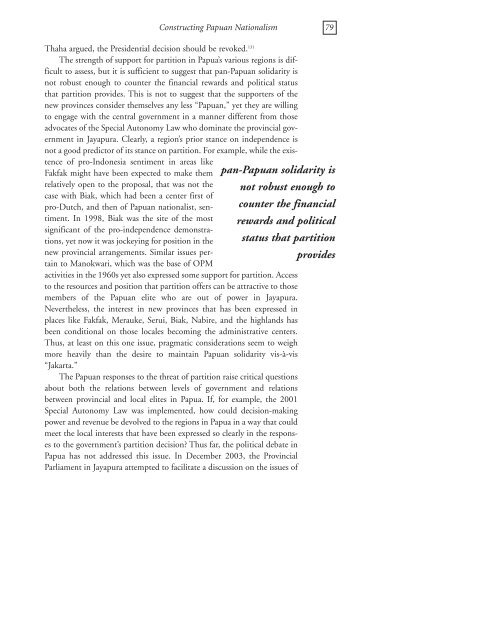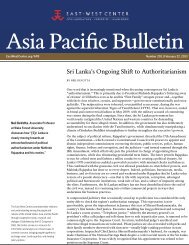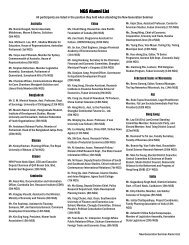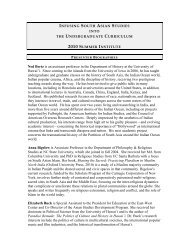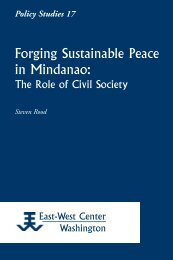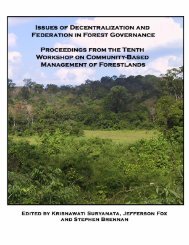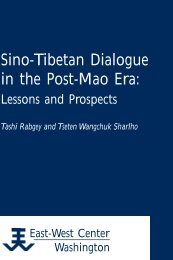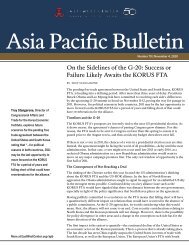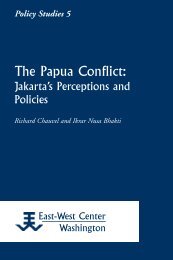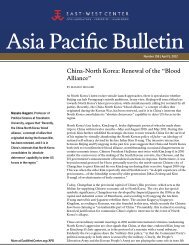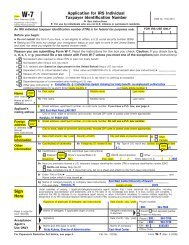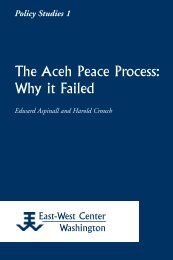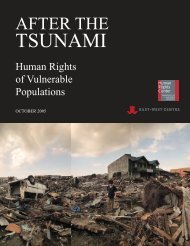Constructing Papuan Nationalism: History, Ethnicity ... - ScholarSpace
Constructing Papuan Nationalism: History, Ethnicity ... - ScholarSpace
Constructing Papuan Nationalism: History, Ethnicity ... - ScholarSpace
- No tags were found...
You also want an ePaper? Increase the reach of your titles
YUMPU automatically turns print PDFs into web optimized ePapers that Google loves.
<strong>Constructing</strong> <strong>Papuan</strong> <strong>Nationalism</strong> 79Thaha argued, the Presidential decision should be revoked. 131The strength of support for partition in Papua’s various regions is difficultto assess, but it is sufficient to suggest that pan-<strong>Papuan</strong> solidarity isnot robust enough to counter the financial rewards and political statusthat partition provides. This is not to suggest that the supporters of thenew provinces consider themselves any less “<strong>Papuan</strong>,” yet they are willingto engage with the central government in a manner different from thoseadvocates of the Special Autonomy Law who dominate the provincial governmentin Jayapura. Clearly, a region’s prior stance on independence isnot a good predictor of its stance on partition. For example, while the existenceof pro-Indonesia sentiment in areas likeFakfak might have been expected to make themrelatively open to the proposal, that was not thecase with Biak, which had been a center first ofpro-Dutch, and then of <strong>Papuan</strong> nationalist, sentiment.In 1998, Biak was the site of the mostsignificant of the pro-independence demonstrations,yet now it was jockeying for position in thenew provincial arrangements. Similar issues pertainto Manokwari, which was the base of OPMactivities in the 1960s yet also expressed some support for partition. Accessto the resources and position that partition offers can be attractive to thosemembers of the <strong>Papuan</strong> elite who are out of power in Jayapura.Nevertheless, the interest in new provinces that has been expressed inplaces like Fakfak, Merauke, Serui, Biak, Nabire, and the highlands hasbeen conditional on those locales becoming the administrative centers.Thus, at least on this one issue, pragmatic considerations seem to weighmore heavily than the desire to maintain <strong>Papuan</strong> solidarity vis-à-vis“Jakarta.”The <strong>Papuan</strong> responses to the threat of partition raise critical questionsabout both the relations between levels of government and relationsbetween provincial and local elites in Papua. If, for example, the 2001Special Autonomy Law was implemented, how could decision-makingpower and revenue be devolved to the regions in Papua in a way that couldmeet the local interests that have been expressed so clearly in the responsesto the government’s partition decision? Thus far, the political debate inPapua has not addressed this issue. In December 2003, the ProvincialParliament in Jayapura attempted to facilitate a discussion on the issues ofpan-<strong>Papuan</strong> solidarity isnot robust enough tocounter the financialrewards and politicalstatus that partitionprovides


